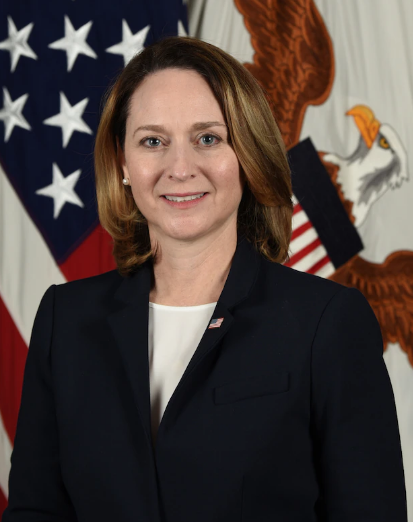August 25, 2022
Defense leader on campus praises Purdue's efforts 'to defend the nation'
Noe Padilla August 19 2022

LAFAYETTE, Ind. — U.S. Deputy Secretary of Defense, Kathleen Hicks praised Purdue University for the success of national security objectives on campus, a Thursday visit that wrapped up a two-day and four-state tour at several institutions.
During her tour, Hicks stopped by the Oak Ridge National Laboratory in Tennessee, Wright-Patterson Air Force Base in Ohio, U.S. Transportation Command at Scott Air Force Base in Illinois and ended her tour at Purdue University.
At Purdue University, Hicks met with faculty and Ph.D. students conducting research on hypersonics technologies and other key national security areas like aerospace technologies, semiconductor productions and energetic materials research.
While on campus, Hicks toured Purdue’s Zucrow Labs and Hypersonics Advanced Manufacturing Technology Center in hopes of gaining a greater insight into future approaches to hypersonic systems.
“Today I had the opportunity to tour Purdue’s Zucrow Labs and Hypersonics and applied research facility. The research here will not only help develop the capabilities we need to defend the nation, but it will drive progress beyond DoD. From the aerospace sector to other industries, shaping the next generation commercial air travel, space exploration and beyond,” said Hicks.
After touring Purdue’s facilities, Hicks held a conference at Purdue’s Neil Armstrong Hall of Engineering with academic faculty and industry partners.
“Purdue is deeply honored to welcome the deputy secretary and her team to a campus that is proud to contribute in any way it can to the cause of our national security,” said Purdue President Mitch Daniels in a press release.
“We are investing heavily in the infrastructure, human and physical, to design, test and develop the systems necessary to protect the freedoms Americans enjoy. As home to some of the world’s most brilliant researchers in areas critical to the national defense, Purdue has a special capacity and, therefore a duty, to do its part, and we will.
Hicks highlighted the importance of the partnership between these institutions and the DoD, regarding advancements toward the defense of the nation.
“Of course, the defense of our nation is job No. 1 at the Department of Defense. We are focused on national security challenges confronting the United States and our friends and allies aboard. Sometimes those threats emanate from other nations and transnational actors, but they also come in the form of pandemics like covid-19 and climate change,” she said.
“Meeting those challenges requires DoD, the federal government and really our entire country to continually innovate, modernize and push the boundaries of science and technology. Our ability to do so is one of America’s greatest strengths.”
Purdue’s ‘creativity and ingenuity’
When it came to Purdue University, Hicks highlighted the innovations achieved by Purdue’s alumni, faculty and students as well as the innovations occurring in between the academic and commercial sectors.
“This very building is a testament to that boilermaker spirit, full of examples, from the Hoover Dam to the Golden Gate Bridge. Reminding us what science and engineering make possible. Every one of them is a product of Purdue Alumni.
“That creativity and ingenuity is alive on this campus today. That’s why earlier this year, the Air Force Research Laboratory picked Purdue as the headquarters for a new network of regional research hubs,” she added.
“Their goal is to create a collaborative science and technology ecosystem. Bringing together government, academia and the private sector, that will accelerate the collision of ideas and talent to produce solutions for both DoD and commercial use”.
During a Q&A session, Hick also highlighted the importance of Purdue’s recent partnership with SkyWater Technology to open a $1.8 billion state-of-the-art semiconductor manufacturing facility in Discovery Park District at Purdue University.
“In the Defense Department, the big constraints that we have faced that we believe that chips and science act is very much going to help us get out of; is both that we can’t be a hundred percent confident in our supply chain today. And so, having onshore production capability, a whole life cycle capability frankly here in the United States can really help us,” she said.
“Another thing I wanted to point to here at Purdue, radiation capability is already a research priority here. And that is a capability that pretty uniquely the Department of Defense and a few other agencies need in order to succeed.”
Over the span of two days, Hicks toured four different institutions and received a better insight into the new innovation occurring for the country’s national security objectives.
“Beyond the Department of Defense, science and technology research and innovation is good for the United States, good for the American people and good for the entire world. It’s an engine of growth that turns small steps into giant leaps.”
